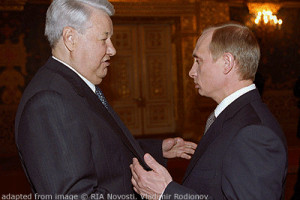1996 Russian Elections Made a Putin Inevitable, von Eggert Says

(Paul Goble – Window On Eurasia – Staunton, June 2, 2021)
Twenty-five years ago, Russia had its last presidential election in which the outcome was not ordained. But after Boris Yeltsin’s orchestrated victory, Konstantin von Eggert says, the country entered yet another non-democratic era in which the rise of someone like Vladimir Putin was inevitable.
In that sense, the independent Russian commentator argues, it is not wrong to see 1996 as having had as fateful consequences for Russia as those of 1991 and 1993 because the manipulated vote showed that even with democratic forms, those in charge could continue to infuse them with authoritarian content (snob.ru/entry/207474/).
For those who have lived their entire conscious life under Putin, von Eggert continues, it may seem “fantastic” to talk about a Russian election in which the results were not foreordained. But that was exactly the case in 1996 when Yeltsin’s standing in the polls had tanked and KPRF leader Gennady Zyuganov appeared to be headed for victory.
Moreover, he says, “a quarter of a century ago on the screen on one federal TV channel the opposition leader (Zyuganov) could call for the retirement of ‘the head of the anti-people clique’ (that is, Yeltsin), while on another, the government’s RTR, Grigory Yavlinsky could demand the Kremlin end the war in Chechnya, and on a third, the satirical program ‘The Puppets’ laughed at the president as a hopeless tool of his entourage.”
The commentator says in the course of preparing a program on the 1996 election, he found that Russian opinion on 1996 remains far more divided than it is on 1991. Those who backed Yeltsin then continue to claim that “the elections took place on the whole honestly” and that journalists backed Yeltsin because they felt it was in their interests.
“But there is another point of view,” von Eggert says. It holds that the refusal of journalists in 1996 to be objective and instead to parrot the Kremlin line convinced those in power that “the manipulation of public opinion and brain washing of citizens will allow incumbents to retain power as long as they want.”
In this view, “1996 became in essence the last year of Russian democracy. More than that, it became the starting point for the rise of Putin to the height of power, despite the fact that at that moment he could not know that.”
“If Zyuganov had won 25 years ago, the backers of this point of view conclude, “then Russia for the first time would have experie4nced a genuine transfer of power to the opposition and this would have laid the foundation for a firm democratic system in the future,” von Eggert says.
In 1996, von Eggert was an Izvestiya journalist. He says he backed Yeltsin given the alternative but that he never refrained from condemning the then-president for his mistakes. “But Russia is a country where halftones as a rule interest anyone.” Instead, people only talk about “who is guilty.” That will last until a large number begin to ask “what is to be done?”
“However,” the commentator continues, “certain lessons of ‘the wild 1990s’ can already be drawn. The chief of these is that society must stop relying on leaders and see in politicians, even the most charismatic, people who must sooner of later pass from the scene.” That is not how Russians approached things then or how they do now.
Instead, he says, in 1996 Russians asks “how can we live without Boris Nikolayevich?” Now they ask “who could there be except for Putin?” Such questions should forever be confined to the past. But that will be hard for a country “where cynicism and extreme individualism display their opposite side of weakness and lack of personal initiative.”
“Amoralism and the sense that everything is permissible, cultivated by the ruling class will never disappear by itself,” the commentator concludes. It will happen only when Russian society “understands that it needs to demand from the powers not only supplements to pensions but a demonstration of a striving to act honorably to move the country forward.”
“If this doesn’t take place,” von Eggert says, “then the argument of ‘the Yeltsin election’ will go on forever.”
[article also appeared at windowoneurasia2.blogspot.com/2021/06/1996-russian-elections-made-putin.html]
